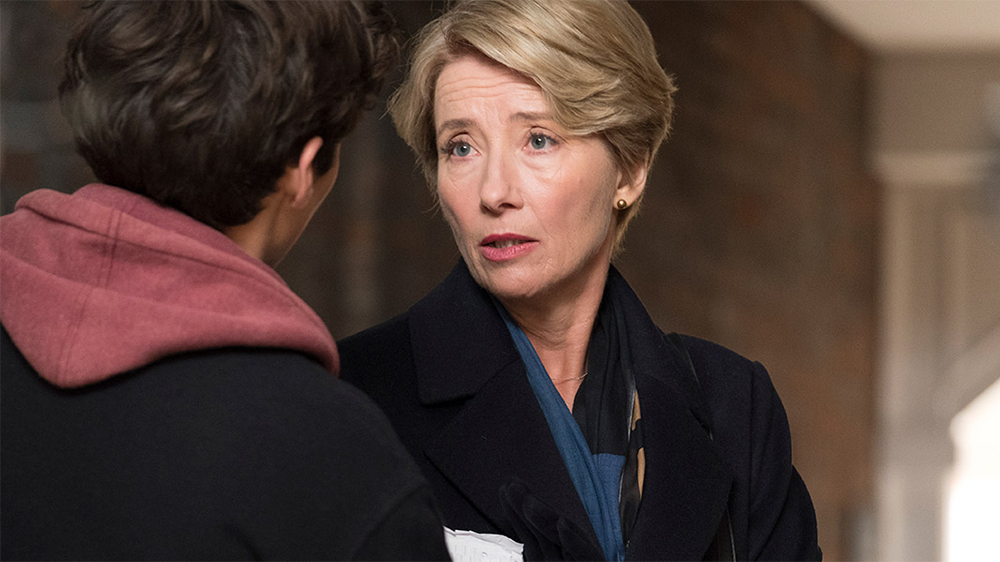The Children Act
The Children Act, 2018, 3 ¼ stars
An uncomfortable Act
Drama challenges notions of legal morality
Exclusive to MeierMovies, September 25, 2018
Britain’s “Children Act” – the law that inspired and lent its name to Ian McEwan’s 2014 novel and director Richard Eyre’s cinematic adaptation – states that a court can disregard the wishes of parents, and even children themselves, to protect the health of a minor. The law makes sense from a societal standpoint, but its enforcement sometimes places a heavy psychological and spiritual burden on not just the child but also the enforcer.
Emma Thompson plays said enforcer in Eyre’s new drama, while Fionn Whitehead (Dunkirk) portrays the boy, Adam. Just months shy of his 18th birthday, Adam has leukemia and needs a blood transfusion. But, as a Jehovah’s Witness, this “very devout and awfully precocious” boy believes that blood is a gift from God. Replacing any of it would alter his soul and alienate him from his parents and his faith, he claims.
Legally, it’s almost an open-and-shut case for Judge Fiona Maye (Thompson), as Adam faces death without the transfusion. But she’s intrigued by the ethical questions surrounding her decision and decides to visit Adam in hospital, opening the door for both a greater understanding of legal moralism and a potentially awkward personal connection between the two. After all, it’s not every day that you get to meet the person who will decide your fate. Adam and his parents might view that entity as God, but it’s really Fiona.
As one would expect from an Eyre film, these events are set against the backdrop of another moral conundrum. In this instance, it’s the pronouncement by Fiona’s husband (Stanley Tucci) that, though he still loves Fiona and wants their marriage to remain strong, he intends to sleep with another woman.
“Couples in marriage often end up like siblings,” he tells her, forcing Fiona to confront not just her husband’s seemingly selfish decision but her own failings as a wife. As with her decision involving Adam, this marital dilemma is not as black and white as it seems.
As with Eyre’s Notes on a Scandal (with Cate Blanchett and Judi Dench), The Children Act is powered by two strong and intriguing performances, by Thompson and Whitehead. Though the film clearly belongs to Thompson, who exhibits both confidence and vulnerability, Whitehead is a scene stealer, even if the film’s final act gives him little to do. He still gets more meaningful screen time than Tucci, however, whose character probably worked better in the novel. In the screenplay, which McEwan adapted himself, Tucci – playing an American among Brits – exhibits his usual, quiet assuredness but seems slightly miscast, relegated to an allegorical device rather than a fully developed character.
A similar criticism could be leveled at the entire film, which is successful at posing moral questions but not as adept at creating an emotionally satisfying narrative. It’s also tediously paced at times and slow to get going, at least before it transitions unexpectedly and cleverly from courtroom drama to something else entirely. It’s this change in tone and plot that should be commended, as the film has the courage to ask us to embrace an uncomfortable, disquieting examination of morality and the personal choices we all make along the path to that perceived morality.
Not as engaging as the aforementioned Notes on a Scandal, this film is on par with the director’s Stage Beauty, with Billy Crudup and Claire Danes. (Interestingly, all three movies address awkward, semi-professional relationships between a man and a woman.) In The Children Act, though, that relationship rises almost to the level of religious parable, with the legal equivalent of God passing judgment on an “only child … dying for faith.”
© 2018 MeierMovies, LLC
Note: As of September 25, 2018, this film was available on DirecTV, with only a very limited theatrical release planned.
